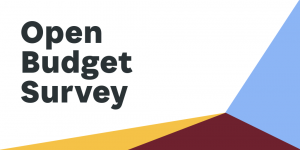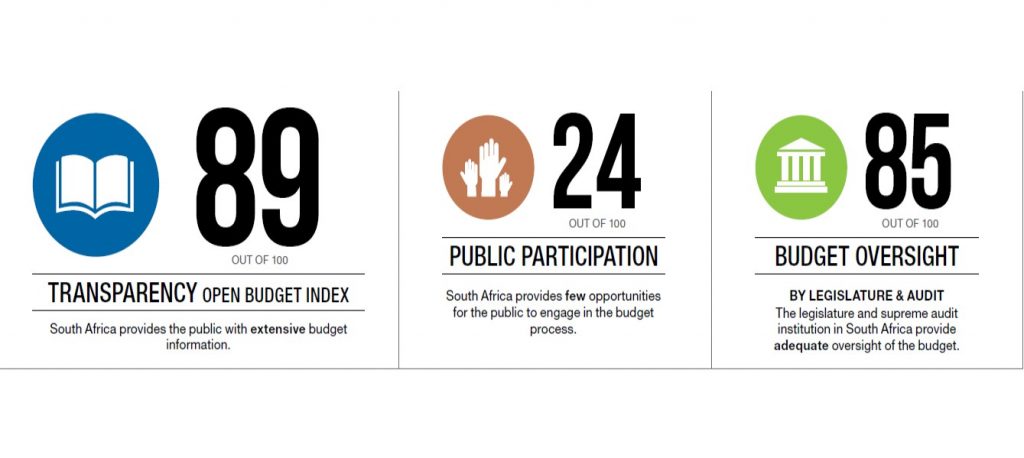
The biennial Open Budget Survey (OBS) provides an important guage of the state of budget transparency around the globe. This is central to the work of a Coalition like Imali Yethu – and so we reflect on the scores on an ongoing basis.
OBS 2021:Public Participation in the budget process on the decline in South Africa according to global rankings of the Open Budget Survey
Jay Kruuse, May 2022
South Africa has regressed in its efforts to expand public participation in national budget processes according to the Open Budget Survey 2021. The Survey is the world’s only comparative, independent and regular assessment of transparency, oversight and public participation in public budgets and has been undertaken across 120 countries. The Survey ranks countries according to their level of accountability in national budget processes.
South Africa’s score for public participation, dropped from an already disappointing score of 24/100 in 2019 to 19/100 in 2021.
“National Treasury and Parliament need to do far more to enable public participation and regain the trust of the public” said Jay Kruuse, Director of the Public Service Accountability Monitor (PSAM), which conducted the research for South Africa. “To encourage greater public participation the following actions should be undertaken:
South Africa’s National Treasury should introduce:
- Pilot mechanisms to encourage the public to monitor budget implementation.
- Actively engage with vulnerable and underrepresented communities, directly or through civil society organizations representing them.
South Africa’s Parliament should:
- Allow any member of the public or any civil society organization to testify during its hearings on budget proposals prior to their approval.
- Allow members of the public or civil society organizations to testify during its hearings on the Audit Report.
The Open Budget Survey also found that South Africa’s Auditor-General should establish formal mechanisms for the public to assist in developing its audit program and to contribute to relevant audit investigations. Currently the Auditor-General does engage the public on its audit investigations but is not formally required by law to do so.
In the area of budget transparency, South Africa has managed to continue its practice of scoring well, achieving a score of 86/100 in the 2021, marginally down from its score of 87/100 in 2019. Only one country (Georgia) achieved a higher score (of 87/100) than South Africa for this aspect of the Survey.
Looking at global trends, the 2021 Open Budget Survey found that legislative oversight globally has declined. Some governments have found ways to undermine Supreme Audit Institutions. Only 31 percent of countries provide sufficiently detailed information to understand how their budget addresses poverty and only 14 percent present their expenditures by gender. Only 8 countries worldwide have formal channels to engage underserved communities in budget processes.
To access the 2021 Open Budget Survey report for South Africa visit https://internationalbudget.org/open-budget-survey/country-results/2021/south-africa
To access the global report on the 2021 Open Budget Survey visit https://internationalbudget.org/open-budget-survey/open-budget-survey-2021
To access the 120 country results visit: https://internationalbudget.org/open-budget-survey/country-results
To access the 120 country rankings visit: https://internationalbudget.org/wp-content/uploads/2021_OBS_rankings.pdf
OBS 2019 and Sector Budget Transparency
Zukiswa Kota, November 2020
2020 has been a year of shock and surprises. Film producers, historians and novelists the world over have more than enough to work with in terms of documenting all that has been. The same can be true of social justice advocates in all their guises – the COVID-19 pandemic has not only laid bare global failure to address poverty and inequality but also reminded us of just how much is possible with genuine multi-stakeholder collaboration. (A blog piece for another day).
In relation to the results of OBS 2019- here are some thoughts worth considering:
- Budget transparency in the health sector needs strengthening
As part of the investigations for the 2019 OBS – 28 civil society organisations collaborated with the International Budget Partnership (IBP) to develop a pilot assessment of budget transparency in the health and education sectors, as part of the 2019 OBS. IY Coalition lead – PSAM – explicitly focussed on the health sector in South Africa. The full details of the sector budget investigation are available via the IBP website here.
The COVID-19 pandemic – with all its devastating impacts – has also created opportunities to assess transparency in sector budgets. Alongside its global counterparts, the South African government has prioritised significant resources to provide social and economic relief against the pandemic. In April 2020, President Cyril Ramaphosa announced a R 500 billion fiscal support package to redirect resources to fund the health response, provide direct support to households and individuals through increases in social grants and supporting workers’ wages. The fiscal relief package is funded through the reprioritisation of the 2020/21 budget and through loans from funders, including the African Development Bank, the New Development Bank and the International Monetary Fund.
Given the likelihood that the pandemic may deepen poverty and inequality in South Africa, the transparency of budgetary and fiscal measures is fundamental. This is an important enabler for legislatures, Chapter 9 institutions, CSOs and the public to monitor how budget decisions are made, and how public resources are ultimately spent.
- We must leverage open data portals like vulekamali to ‘follow the money’ in sectors like health and education
In South Africa, inequality in health access is largely correlated with geography, gender and race. So transparency in the distribution of financial resources at the district and/or facility level is important. The geospatial differences are critical. This is why the development of geospatial infrastructure data to complement the publication of open budget data via Vulekamali is so critical. The portal has data on approximately 17 000 public infrastructure projects (schools, hospitals, boreholes, libraries etc). This is in addition to the publication of budgeted and actual expenditure data by province, department or programme dating back to 2016/17. For budget analysts, data scientists and developers; the data on the portal are also available in the datastore and application programming interface (API). Read more via the PSAM website.
- Budget transparency remains high but we must work harder to strengthen meaningful participation
South Africa and New Zealand once again achieved top scores for overall budget transparency of the 117 countries surveyed. The OBS 2019 also revealed that a limited number of countries provide meaningful opportunities for the public to participate in the budget process. This has the effect of undermining the public’s ability to effectively use available budget information. Encouragingly – the results also indicate that innovation mechanisms in some countries has strengthened public engagement. There is scope for South Africa to learn from these contexts. Read more here.
OBS 2017: Transparency and Participation in South Africa
Zukiswa Kota, February 2019
On 31 January 2018, the news that South Africa had been ranked number one on the Open Budget Index (OBI) offered welcome respite from the heavy news of recent months. A little celebratory jig was certainly in order and I imagine this was the case in the hallways of the National Treasury – however brief.
The Open Budget Survey (on which the OBI is based) draws on internationally accepted criteria across 109 indicators to measure budget transparency. Amongst others, these indicators are used to determine whether the national government makes eight key budget documents available to the public in a timely manner. The indicators also assess the usefulness and comprehensiveness of the data in these documents. The OBI is a composite ranking of each country out of a possible score of 100. According to the International Budget Partnership (2015) – the OBS is “the world’s only independent and comparative measure of budget transparency.” In 2017 the survey looked at 115 countries.

While this transparency score is a veritable achievement for all advocates of open government and fiscal transparency in South Africa – the ultimate objective remains somewhat elusive. The OBI also measures the degree to which the government creates opportunities for the public to engage in budget processes throughout the fiscal calendar. Importantly – this also includes engagements with supreme audit institutions (the Auditor-General) as well as the legislative and the executive sectors. Here the news is dismal. Scoring 24 out of 100, South Africa is not the worst in the world but is certainly not a shining example of public participation in budgeting.
It is commonly acknowledged that transparency is not an end in itself but it constitutes a vital step towards achieving the goals of greater accountability and improved public resource governance. As proponents of both fiscal transparency and public participation – one of IMALI YETHU’s missions is to ensure that we progressively go #beyondtransparency. Thus the emphasis on inclusive, participatory processes.
There are several interesting examples of public participation or participatory budgeting around the world. Kenya and Mexico are noteworthy. The Kenyan Constitution enacted in 2013 makes some provisions for citizen participation within its devolved budget process. This means citizens are afforded opportunities at the county level to have their voices heard on fiscal issues affecting them. While elements of participatory budgeting can be identified in the Mexican context as early as the 1980s, the enactment of the Citizen Participation Law of the Federal District in 2010 introduced greater state investment in participatory budgeting processes at the local government level. This law stipulates, for instance, that 3% of each local authorities’ budget must be spent on participatory budgeting activities. In both these countries – there are clear benefits of participatory budgeting but the authors of a 2018 study by mySociety that explores these in greater depth – highlight the importance of interrogating the objectives, methodologies and outcomes of these processes. The knowledge that these processes are inherently political, interest-driven and complex should inform the design of participatory budgeting interventions – digital or otherwise.
The Global Initiative for Fiscal Transparency (GIFT) recently devised new principles on public participation which include accessibility, respect for self-expression, inclusiveness and timeliness across the various stages of the fiscal policy cycle. It is these principles that were used to inform the questions pertaining to public participation in the 2017 OBS. These ten principles are now globally accepted norms on public participation in national budget processes and constitute an important strengthening of the OBI indicators.
GIFT’s Lead Technical Advisor, Murray Petrie, reflecting on lessons from the OBS public participation results raises the following points that are helpful reminders for civil society and government reformers alike;
“If more governments do not become more inclusive in how they design and implement taxation and public spending, we are much less likely to counter the negative trends with respect to inequality, willingness to pay taxes, and trust in government. One challenge from OBS 2017 is to work much harder on inclusive public engagement in the management of public finances.…..direct public engagement has the potential to transform the disclosure of fiscal information into more effective accountability and better development outcomes.”
And – here is comes a particular gem of a reminder about the value of a platform such as vulekamali;
“….the ICT revolution has given it a major shot in the arm, by dramatically cutting the cost of direct interactions between governments and citizens, as well as by making possible entirely new forms of public participation.”
It is these new ways of thinking, engaging and doing that we must collectively embrace. As with any quest – the unknowns, unknowables and risks are abundant. Along the way there will be naysayers and detractors but ultimately the commitment to achieving something outrageously ambitious must sustain us. In this case – the team working on vulekamali have the outrageously ambitious goal of going #beyondtransparency towards participatory budgeting and a system in which accountable governance and effective, inclusive service delivery is a reality.
Let’s embark on this quest to travel #beyondtransparency – join us!
